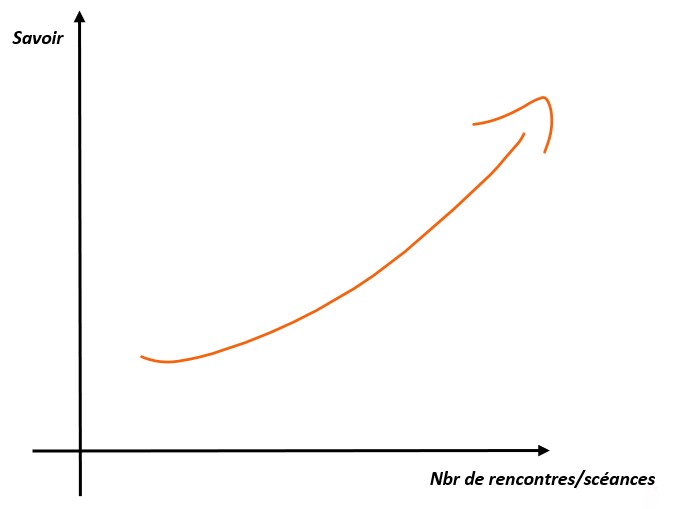How to use efficiently your time to produce creative solutions in team ?
Contacts, encounters, meetings and events offer us the opportunity to constantly learn new things, which is amazing.
Those encounters lead to the following situation :
However, there is also a backward effect – the more time we spend meeting people, the less creative we become (or generating new ideas). Here is the next graphical comparison :

It is fundamental to respect each other’s availability and share it only if it can lead to tangible results.
In other words, work collaboratively ! For exemple, a workshop is much more productive than an ordinary meeting session, because :
- many thoughts are reunited
- information is shared
- the time for the sessions is reduced
- tangible results come out from this
The conclusion is simple :
Transform your ordinary meetings into group workshops.
If you think, “yes, but how can we do that?“, here are few ingredients to be considered when creating a collaborative working session :
Process
- First, clearly define the objective of the session.
- Invite the participants, with preferably a mix of backgrounds in each group (to offer fresh point of views).
- Share the agenda beforehand : objectives, results wanted, etc. in order for everyone to be prepared and start the meeting with some ideas in mind.
- Insure to have the right place and material available (wide space, course files, drinks, etc.) and organise a working space that can not be interrupted by external events (such as phone calls).
- Clearly define the following points from the beginning :
- The role of each participant. To make it simple, there are 2 types of roles :
- neutral host : participates in a neutral way, does not know the field of work very well, is here only to take control of the process.
- facilitator : also manages the process, as the neutral host, but also gives his ideas, expertise and point of view.
- Everyone should listen without interrupting – except if the speech takes way to long.
- Focus on the facts and not the personnality. If it is necessary to download data, encourage whiteboard writing instead of videos and films (this prevent from contributing).
- What the final results will look like. The next step, the responsabilities, etc., and how the final decision will be constructed (consensus for the team, etc.).
Now you can start ! Be careful : be strict with the timing !
Some difficult situations
- The adjudicator takes the lead : you should be able to make an agreement beforehand with the adjudicator. He should be an equal participant (no hierarchy) during the discussions. Most of all, avoid to choose the facilitator as adjudicator.
- No one wants to take responsibilities for the next steps : you can ask the participants “who would be the most efficient to do this?“, or you can ask to the hierarchical adjudicator “who is the best choice for this specific task?“.
- There is only little time left : separate the themes/questions of the session into phases and inform the group that they have maximum 15 minutes to work on each of them. Long discussions would reduce the quality of the decision and often is comparable to procrastination.
Keep in mind that the objective of this collaborative workshop is to come to an concrete solution for the well-being of the organisation/company, and not for the well-being of few.
Enjoy your workshop !
